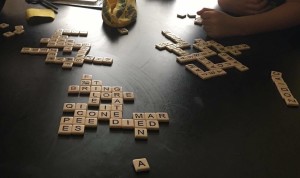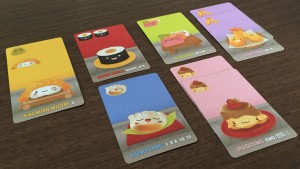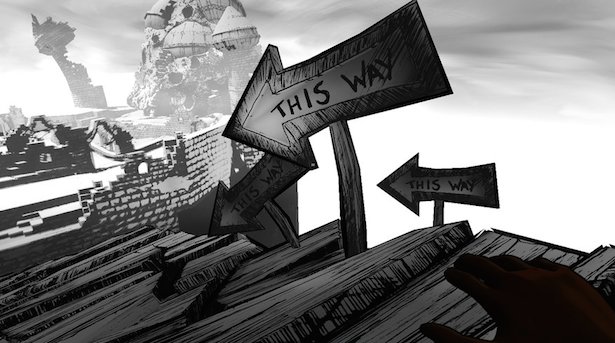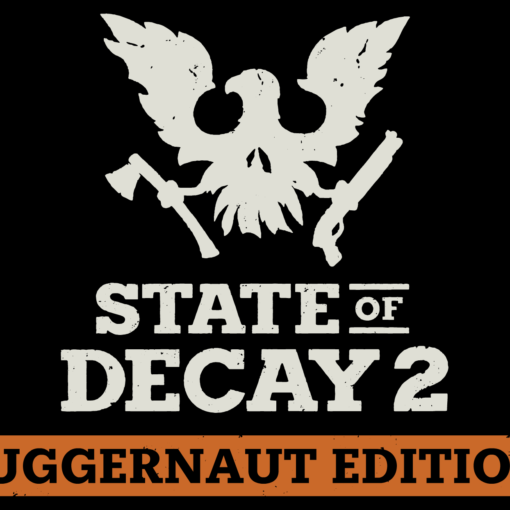So my gaming has been quelled a bit by a freak accident. I somehow managed to take a sizable chunk of my thumb out with a bottle opener. I will spare you the gory details, but suffice it to say that even the ER nurse was impressed by my incredible ability to maim myself in such a ridiculous way. So while I haven’t had a ton of hands on time with video games I have had some fun times playing analog games while homeschooling.
Now I have to admit that I haven’t really focused much on small gaming experiences with Pea up until now. Most of our gaming has been done on boards (with the exception of small games like Timeline and Story Cubes) because she’s really wants to play games like the grown ups. Big boards, big set ups, and big stories, but playing games as a part of our homeschooling curriculum doesn’t always give us a lot of time for those kinds of gaming experiences. Sometimes we want something that we can squeeze in between other things, in the car while driving to special lessons or the library. Two of the most popular games that we’ve played in the last week have been Bananagrams and Sushi Go!
 Bananagrams have been great because we are working with two kiddos with different reading levels so being able to build their own boards, so to speak, means that they don’t have to compete with one another in terms of points. While competition is a big deal for these two kids in particular they have been more than happy to compete by seeing who uses all of their tiles first (and gets to draw more tiles while yelling “Peel!” and make everyone else draw more too) and even with who gets to swap one tile for three when they get stuck (and that means getting to yell “Dump!”). So, I guess that means they just compete by seeing who gets to yell loudest and most often. When we play Bananagrams, it really becomes more of a cooperative experience. We spend time looking at each others’ boards and thinking about what words we might make if only we had a… It’s a great way for working on our spelling skills and thinking about how words are made (and for working together).
Bananagrams have been great because we are working with two kiddos with different reading levels so being able to build their own boards, so to speak, means that they don’t have to compete with one another in terms of points. While competition is a big deal for these two kids in particular they have been more than happy to compete by seeing who uses all of their tiles first (and gets to draw more tiles while yelling “Peel!” and make everyone else draw more too) and even with who gets to swap one tile for three when they get stuck (and that means getting to yell “Dump!”). So, I guess that means they just compete by seeing who gets to yell loudest and most often. When we play Bananagrams, it really becomes more of a cooperative experience. We spend time looking at each others’ boards and thinking about what words we might make if only we had a… It’s a great way for working on our spelling skills and thinking about how words are made (and for working together).
 Sushi Go! is a game that Alisha and her crew introduced us to a while back. It’s a small card game that involves one of Pea’s favorite things, sushi! The rules of play are simple. You pass hands of cards back around the player circle and you choose the card that you would like to add to your deck. You collect sets of cards to build runs or to collect more than the other players of a particular card. One of the things that the kids have learned quickly that there can be up and downsides to choosing to collect certain things over others when it comes to scoring things at the end of the round or game. It’s fun to see their individual strategies develop across games. At the end of the rounds each player has to add up their points based on the cards that they have collected. If you have younger children it’s easy to add them up based on come basic addition, but for our 3rd graders (the perfect age for beginning to learn multiplication) we spend some time adding up our cards and thinking of the problems in terms of multiplication. It’s quick and dirty and only a few problems per round, but all positive reinforcement helps. It also helps to justify why it is so important to be able to do multiplication when the “math” is just not so interesting.
Sushi Go! is a game that Alisha and her crew introduced us to a while back. It’s a small card game that involves one of Pea’s favorite things, sushi! The rules of play are simple. You pass hands of cards back around the player circle and you choose the card that you would like to add to your deck. You collect sets of cards to build runs or to collect more than the other players of a particular card. One of the things that the kids have learned quickly that there can be up and downsides to choosing to collect certain things over others when it comes to scoring things at the end of the round or game. It’s fun to see their individual strategies develop across games. At the end of the rounds each player has to add up their points based on the cards that they have collected. If you have younger children it’s easy to add them up based on come basic addition, but for our 3rd graders (the perfect age for beginning to learn multiplication) we spend some time adding up our cards and thinking of the problems in terms of multiplication. It’s quick and dirty and only a few problems per round, but all positive reinforcement helps. It also helps to justify why it is so important to be able to do multiplication when the “math” is just not so interesting.
There are so many good small games with great pedagogical possibilities and some of them we don’t actually see until we actually play the games. For us the solution has been to play games that we see as being fun and then thinking about what things can actually be learned from them. That also means that I will be taking time to tell you all about our experience playing the new games! Until then, play with your kids!




